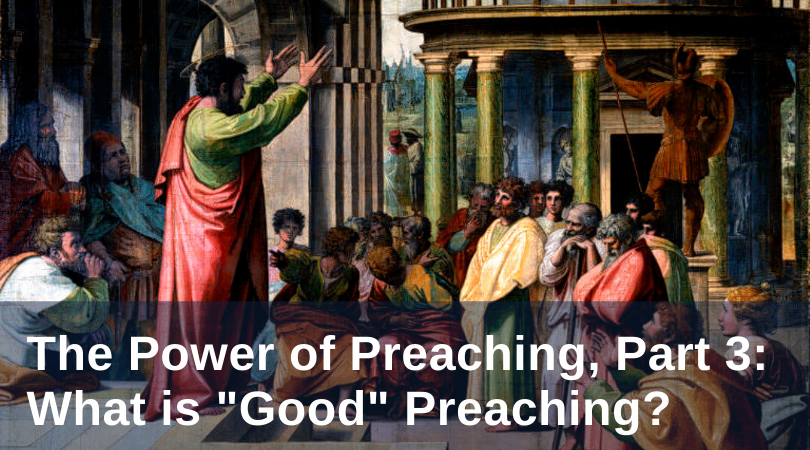
In the previous installments of this series, I described preaching as a relationship that leads to an encounter with God. But what constitutes “good” preaching? Can it really change people’s lives? How we define “good” preaching affects both how preachers evaluate themselves and how listeners respond in feedback. If preacher and parishioner are to work together to renew Catholic preaching, then what does “good” mean?
Priests tell me that it is draining to try to be creative and inspiring day after day. Changing someone’s life seems like an impossibly high bar. In a parish setting, a pastor may preach ten times a week. Some say they start to “phone it in” and nobody seems to notice or care. Parishioners may also not anticipate that Sunday preaching will affect their lives or lead them toward God. They may have low expectations for “good.” Thus, “good” preaching can dissolve into “good enough” preaching.
If we each take responsibility for the growth of Catholic preaching, can we begin to grapple with “effectiveness” together? What does “good” preaching entail? And how do we get there?
Many homiletic fundamentals make up a preacher’s effectiveness: speak clearly, make one point, have something to say that relates to parishioners’ everyday lives, and structure the homily clearly for listening—these form the “how” of preaching. How and why a listener hears also has many pieces and parts. But from what I have seen in coaching preachers, one element makes a huge difference in relational preaching for encounter. “Good” preaching is the witness of a preacher who is in love: in love with his people and in love with his God. This is not a mushy “feeling” kind of love; this is a dedicated caring for the good of the other. In “good” preaching, the Holy Spirit moves from a deep place within the preacher to a deep place within the heart of the community. God is at work.
The spiritual renewal of the preacher is foundational to the renewal of the homily. The spiritual renewal of the parish community is also integral to the relationship of preaching. A man preaches differently when he knows that he is cared for by God and by his people. A parish hears differently when they know they matter to God and to the homilist.
Just as someone who loves football talks of football, so the preacher in love with the living God wants to speak of the One who is active in his life. Whether it be the Father, Son, and/or Spirit about whom he speaks, there is divine vigor in effective preaching. A litmus test for effectiveness is when those listening can sense that the preacher has met the One about whom he speaks. God does not come across as an abstract idea, a concept, or a vague platitude. God is real and active in this man’s life.
When liturgical preaching is an act of love, its content is Paschal. It names the real struggles of human life—our crucifixion moments. It also names the joys—our resurrection moments. But at the heart of effectiveness is to name the Who: Who is it who brings us from death to life? This action of the Holy One is what sets Christianity apart from Pelagian self-help efforts. A high percentage of the homilies that I evaluate implicitly leave us to lift ourselves up—they leave out the action of the “Who.” Yet we cannot flourish by ourselves. In the Paschal mystery, God is the One who brings us from darkness to light, lifting us up, intervening in daily life. “Good” preaching explicitly names that Who, the agent of our salvation. It leads us to encounter the Lord of our lives, which then properly disposes us to the richness of the Eucharistic table. Then, empowered by both Word and Sacrament, we move out into the world to fulfill Christ’s mission.
We are looking for the Lord to speak to us through our liturgical preaching. But none of us can do this alone: we can begin to open the conversation between pulpit and pew. If you are a preacher and someone says, “Good homily, Father/Deacon/Bishop,” (and this is someone who trusts you), ask him or her for more. Find out how that parishioner defines “good.” If you are a parishioner, pray for the renewal of our preachers. And rather than offering a vague comment at the door, delve into the elements of effectiveness (see articles linked above) and offer one specific affirmation about the homily. Let him know that his witness to God matters. We are in this homiletic journey together. It is the living God who wants to speak to us through the words of our preachers. God bless and keep them all!
Like what you read? Submit your email below to have our newest blogs delivered directly to your inbox each week.
Featured Image: Raphael (1483–1520), St. Paul Preaching in Athens (1515); public domain.


